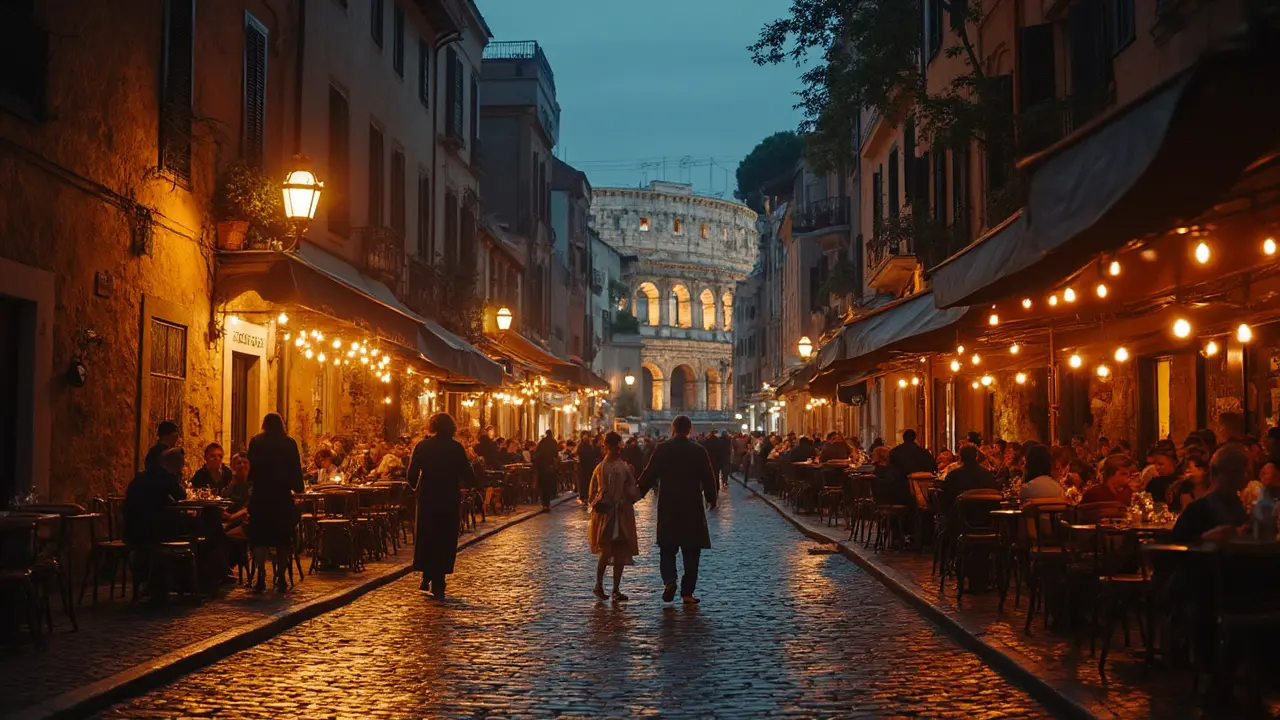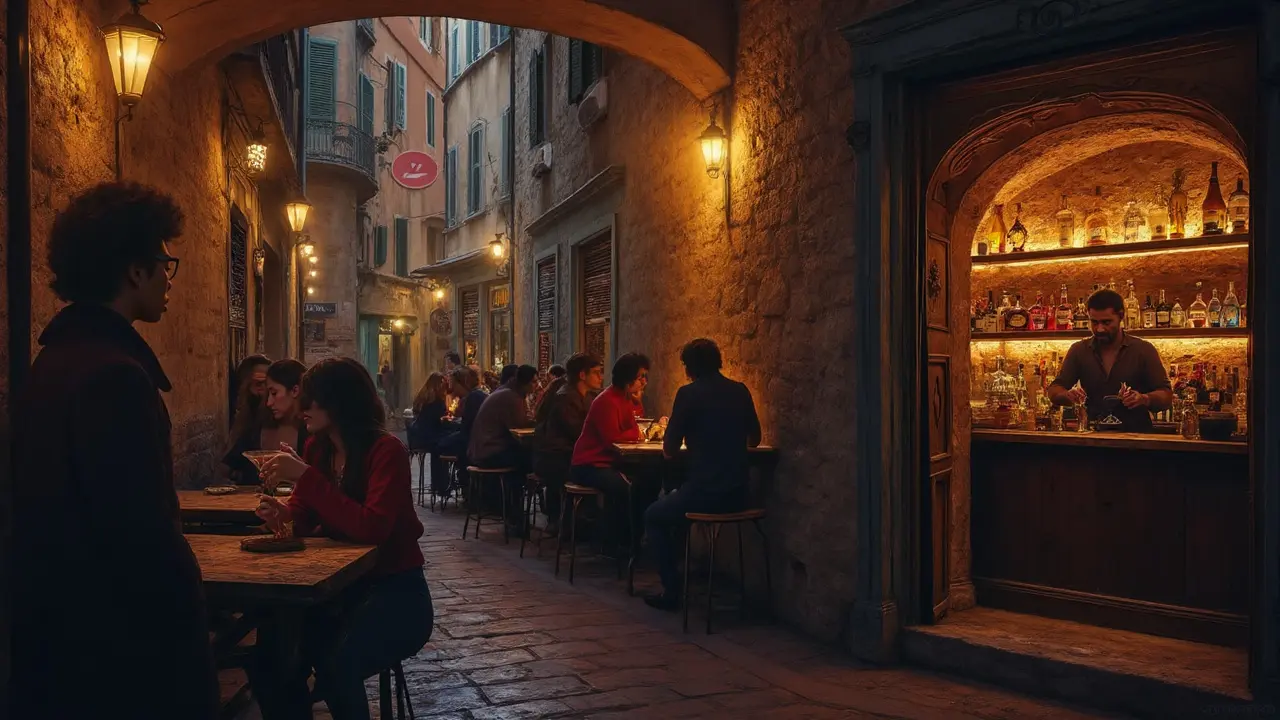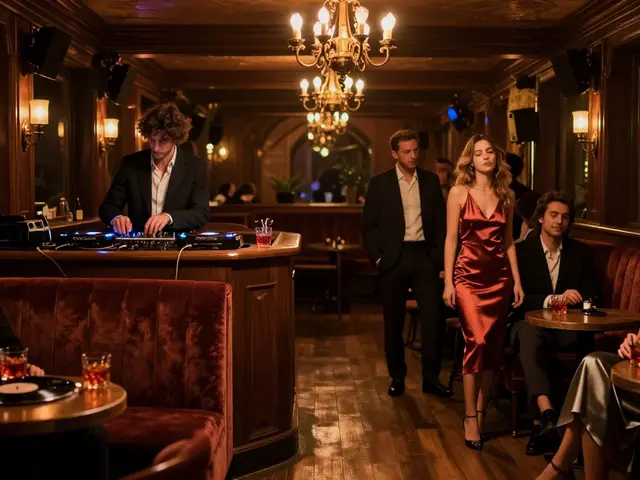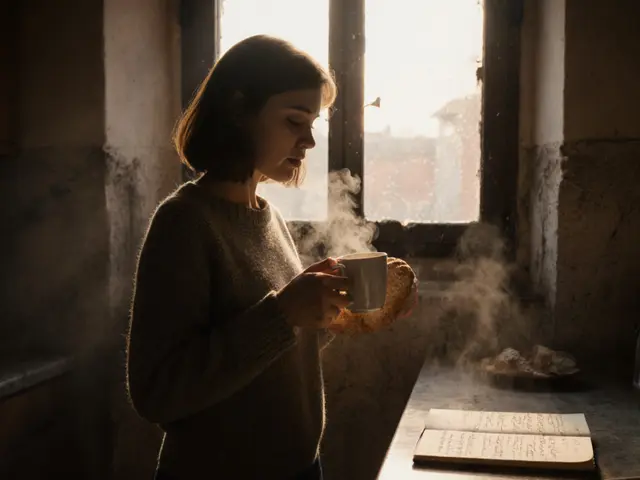
Rome completely changes after the sun goes down. Streets that were packed with tour groups turn quiet, and everything feels more relaxed. Grab a gelato, and suddenly, iconic spots like the Trevi Fountain or Spanish Steps are almost empty—way better for soaking up the atmosphere without elbowing your way through crowds.
If you’re hungry, the options don’t shut down with the museums. In fact, most Romans eat late, so you don’t stick out grabbing dinner at 10 p.m. Neighborhoods like Trastevere come alive at night, packed with trattorias, pizza spots, and crowded wine bars. Don’t bother wearing anything fancy—just comfy shoes, because you’ll definitely end up walking a lot.
- Iconic Night Walks and Sights
- Late-Night Food and Drink
- Hidden Bars and Local Hangouts
- Live Music, Cinema, and Culture
- Night Markets and Unique Shopping
- Safety, Getting Around, and Local Tips
Iconic Night Walks and Sights
Walking around Rome at night isn’t just about sightseeing—it’s the best way to miss the tourist crowds and see the city in a different light (literally). Most of those world-famous spots you wrestle with crowds to visit during the day are almost empty once it gets dark. It gives you a chance to really see the details and snap photos without a hundred strangers in the frame.
- Rome at night is hands-down the easiest way to take in the Colosseum. It's lit up and even more dramatic. You can’t go inside after hours, but the view from the outside fence is unbeatable. Sometimes locals gather here to relax, so it never feels unsafe or deserted.
- The Trevi Fountain after midnight is a game-changer. No massive groups, and you’ll actually hear the water—not just camera shutters. Bring a coin if you want to stick with the tradition of tossing one in for good luck—it’s more fun when it’s quiet.
- Start your walk from Piazza Navona, loop around to the Pantheon, then hit up the Spanish Steps. Each spot has a totally different feel at night. The Pantheon’s square is almost peaceful, and you'll find street musicians playing there some evenings.
- If you want something off the main tourist route, check out the Gianicolo Hill above Trastevere. The views over the rooftops of the city are incredible, and it’s open 24/7. The top is popular with couples, but it's not just for romantics—the city lights are worth it.
Here’s a quick look at the best times for night walks and when these places are at their quietest:
| Sight | Best Time for a Night Visit | What You'll Experience |
|---|---|---|
| Colosseum | 9 pm – 1 am | Lit up, usually a relaxed local vibe |
| Trevi Fountain | After 11 pm | Almost empty, perfect for photos |
| Piazza Navona | 10 pm – Midnight | Artists and street performers |
| Pantheon | After 10:30 pm | Pictured without crowds, street musicians |
| Gianicolo Hill | Anytime | City lights, quiet atmosphere |
One tip—always keep a water bottle and comfy shoes. The cobblestones don’t mess around. Most areas are well-lit and safe, but stick to bigger streets as you head between neighborhoods, just like you would in any major city.
Late-Night Food and Drink
Rome doesn't slow down when it comes to food. Most local restaurants (osterias and trattorias) serve dinner late, with kitchens often open until 11:30 p.m. And if you’re not ready to call it a night, you’ve still got options. Spots like Trastevere are famous for their buzzing nightlife, but you’ll also find legendary pizza by the slice joints near Termini and Campo de’ Fiori staying open until well past midnight.
You can't skip late-night street food in Rome. Supplì (fried rice balls), porchetta sandwiches, and thin Roman pizza slices are quick, filling, and super popular after hours. Try the historic ‘Trapizzino’ shop near Piazza Trilussa—locals swear by the pocket-shaped pizza filled with meats or eggplant parmesan.
If you’re in the mood for something sweet, gelaterias like Giolitti and Fatamorgana keep doors open into the wee hours. Sitting on the curb with a cup of pistachio gelato is basically a rite of passage.
Cafes and bars don't disappoint either. Rooftop cocktail bars are big here, especially around Via Veneto or Monti, where you can sip a Negroni with city views. If you’re more into wine, check out “enoteche” (wine bars) like Il Goccetto where you can try by the glass and nibble local cheeses and meats.
| Type | Typical Closing Time | Neighborhood |
|---|---|---|
| Pizza al taglio | 1:00–2:00 a.m. | Campo de’ Fiori, Termini |
| Osteria/Trattoria | 11:00 p.m.–midnight | Trastevere, Testaccio |
| Gelateria | 12:00–2:00 a.m. | Pantheon, Trevi, Centro Storico |
| Wine Bar | 1:00–2:00 a.m. | Monti, Parione |
One quick tip: most late-night spots stay packed on weekends, so try going out on a weeknight if you want to dodge the crowds. And always check if you need a reservation—trendy places fill up fast, even at 10 p.m.
Hidden Bars and Local Hangouts
Rome’s nightlife isn’t all flashy clubs. The real fun hides in small bars you’d miss if you weren’t looking for them. You’ll find these local gems tucked behind unmarked doors or down narrow alleyways. Want to skip the mainstream and do what locals do? Make a beeline for a speakeasy or no-frills pub after dinner.
Start in the Monti neighborhood, just a short walk from the Colosseum. Blackmarket Hall is a favorite, with its quirky vintage vibe and creative cocktails. Not far away, Drink Kong—rated one of the World’s 50 Best Bars—brings a Tokyo-cyberpunk theme and some seriously cool drinks. If you want something less flashy and more Roman, try Libreria Caffè Bohemien. It doubles as a bookstore by day, then swaps out paperbacks for Aperol Spritz at night. Other hotspots: Il Goccetto (a centuries-old wine bar in the center) and Jerry Thomas Speakeasy, which has a secret password but serves up old-school classics in a cozy basement.
- Rome at night feels different in these places—locals and visitors sit shoulder-to-shoulder, and the bartenders are usually happy to recommend something local.
- Most of these bars don’t do meal service, but snacks (think olives, chips, or mini panini) are usually free when you order a drink.
- If you’re into craft beer, check out Open Baladin near Campo de’ Fiori for a long list of Italian brews.
- Want a laid-back piazza vibe? Head to Piazza della Madonna dei Monti or Campo de’ Fiori where locals bring their own bottle and hang out till late.
Curious how much you’ll pay for a night out? Rome is surprisingly affordable for bar-hopping. Here’s a quick cost comparison to help you plan:
| Drink | Average Price (€) |
|---|---|
| Beer (bottle) | 5-7 |
| House Wine (glass) | 4-6 |
| Cocktail | 8-12 |
| Snacks (included with drinks) | Usually free |
Don’t forget, weekends get crowded in the city center, so it’s smart to show up a bit earlier or book a table if you can. No one expects a fancy dress code, but bring a light jacket—outdoor seating is huge, even after dark. When in doubt, just ask someone working at your hotel or Airbnb. Locals love sharing their favorite neighborhood spot, and you’ll walk away with a way better story than from any tourist trap.

Live Music, Cinema, and Culture
Rome doesn’t hit pause at sunset—it actually cranks up the volume. If you’re even a little into live music, check out places like Big Mama in Trastevere, probably the city’s most famous jazz and blues club since 1984. For something smaller and indie, Monk Club in the Tiburtina area regularly packs in crowds for everything from rock to hip hop, and the outdoor garden is perfect in the warmer months.
Classical music and opera fans, don’t skip Teatro dell’Opera di Roma. Their summer open-air schedule at the Baths of Caracalla is wild—where else can you watch world-class opera surrounded by ancient Roman ruins under the stars? If you want something more casual (aka cheap and zero dress code), keep an eye out for free piazza concerts thrown by local bands, especially during summer festivals.
Cinema has a cult following in Rome, with plenty of options after dark. Movie buffs should hit Cinema Farnese or Nuovo Sacher to catch indie films, documentaries, and foreign movies—often in English with Italian subtitles. Summer is legendary for open-air movie nights. From June to September, you’ll find screens popping up in parks like Villa Borghese at the Casa del Cinema, with affordable tickets and a chilled-out crowd.
| Venue | Type | When to Go | Typical Ticket Price |
|---|---|---|---|
| Big Mama | Jazz/Blues | Thu - Sat | €15-20 |
| Monk Club | Indie/Rock/Hip Hop | Thu - Sun | €10-20 |
| Teatro dell’Opera (Caracalla) | Classical/Opera | Summer Evenings | €25-80 |
| Cinema Farnese | Art House Cinema | Daily | €7-10 |
| Casa del Cinema (open-air) | Outdoor Films | Jun-Sep | €5-8 |
And here’s a tip: locals don’t try to squeeze in everything in one night. Start with dinner, catch some live music nearby or pop into a late-night screening. No rush—Roman nightlife is all about enjoying the moment. Want to really fit in? Grab a beer and listen to whoever’s playing in a piazza before heading home. That’s a real Roman evening.
Night Markets and Unique Shopping
Nighttime in Rome isn’t just about the food and sights. Shopping takes on a whole new vibe after dark, and you’ll find all sorts of cool stalls, open-air markets, and pop-up events, especially on weekends from spring through early fall.
The most famous night market is Mercato Monti Urban Market. It’s not your typical tourist spot. This indoor market usually stays open late on Fridays and Saturdays. Here, you’ll find local designers, vintage clothes, handmade jewelry, vinyl records, and even zines. It’s a popular haunt for people looking for something different from souvenir stands. Prices aren’t rock-bottom, but the one-off finds are worth it if you want something unique to take home.
Another fun stop is the Piazza Navona art market, where local artists sell paintings, caricatures, and photography under the streetlights after dinner. This market runs almost every night in high season, especially from May to September. You can actually watch some artists work live—it’s a great way to pick up a one-of-a-kind gift or just people-watch.
If you’re into antiques and used stuff, check out the Borghetto Flaminio Market. It’s a flea market style event, usually running on Sunday evenings, but special night editions pop up a few times a year when there’s a festival or holiday. Come early—the best pieces get snapped up quick.
- The hours for these night markets change a lot, so check their social media or ask your hotel for the latest info.
- Bring cash—many small vendors don’t accept cards, even now.
- Planning to shop a lot? Bring an extra tote or backpack so you’re not carrying plastic bags all night.
If all you want is to hit real stores, the streets around Via del Corso stay buzzing late, especially during sales. Shops often run extended opening hours until 10 p.m. in June and July, which is perfect for finding deals after dinner.
Here’s a quick look at the bigger night shopping spots and when they’re usually busiest:
| Market/Street | Average Opening Hours | What to Buy |
|---|---|---|
| Mercato Monti Urban Market | Fri & Sat 5 p.m. – midnight | Vintage fashion, design, vinyl |
| Piazza Navona Art Market | May–Sept, nightly 7 p.m. – midnight | Art, photos, street art |
| Borghetto Flaminio | Selected Sun 5 p.m. – 11 p.m. | Antiques, retro items |
| Via del Corso shopping | Daily, up to 10 p.m. in summer | Mainstream & luxury retail |
Diving into these night markets gives you a totally different side of Rome at night. You might even stumble on a local festival with extra music or street eats. Go with a bit of curiosity, and you’ll never walk away empty-handed.
Safety, Getting Around, and Local Tips
Rome at night is generally safe in tourist areas, but you still need to watch your stuff. Pickpockets can hang out around popular sights and at bus or metro stops, especially after dinner when folks are distracted or a bit tired. If you’re carrying a bag, keep it zipped and in front of you. Don’t flash expensive jewelry or leave your phone on the table.
Getting home late can be a pain if you’re not prepared. The Metro stops running at 11:30 p.m. on weekdays, and 1:30 a.m. on Fridays and Saturdays. Night buses pick up after that, but the routes get confusing if you’re not used to them. Most of the action happens in neighborhoods like Trastevere, Monti, and Testaccio—good news is these areas are walkable, but if you need a ride, use an official taxi stand or a rideshare app like Free Now, not random cabs on the street.
Here’s a quick breakdown of public transit options at night:
| Transport | Weekday Hours | Weekend Hours | Single Ticket Cost |
|---|---|---|---|
| Metro | 5:30 a.m. – 11:30 p.m. | 5:30 a.m. – 1:30 a.m. | €1.50 |
| Night Bus | 11:30 p.m. – 5:30 a.m. | 1:30 a.m. – 5:30 a.m. | €1.50 |
| Taxi (official) | 24/7 | Start €3 – €6, varies by distance | |
Most of the nightlife and Rome at night action happens in places packed with locals and tourists, but some side streets can be quiet. Trust your gut—if a street seems sketchy, just head somewhere busier. It's smart to download Google Maps offline or use apps like Moovit so you don’t get lost when Wi-Fi is spotty.
ATMs can run out of cash late, especially on weekends. Bring enough euros for the night, since some bars and small pizzerias still don’t take cards. Also, Roman police (the "carabinieri") are usually friendly if you need directions or something feels off, so don’t be shy to ask.
- Plan your late-night route before heading out.
- Stick to main squares and well-lit areas.
- Double-check public transport hours on official ATAC (Rome’s transit agency) website or app.
- Split a taxi with fellow travelers if it’s late and you’re far from your place.
Staying safe and moving around Rome by night is easy with a bit of street smarts. Just keep your phone charged, walk with confidence, and you’ll have a blast.



